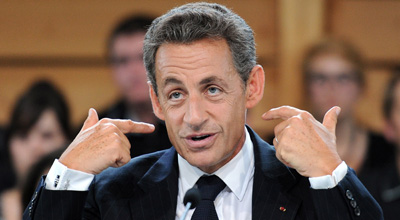“The freedom of the press and the lie of the state.” The headline Thursday in the influential newspaper Le Monde was bound to make a big splash. While President Nicolas Sarkozy was basking in the glory of his Libyan intervention and celebrating the virtues of democracy, the French “paper of record” was denouncing the dark side and the dirty tricks of his government.
In September 2010, the paper had filed a lawsuit against Sarkozy’s office when it became convinced that the secret services had illegally intercepted the phone records of one of its reporters, Gérard Davet. Following the money trail of the past presidential election and drawing from confidential sources, the seasoned investigative journalist had exposed dubious connections between Liliane Bettencourt, the richest woman in France, and Eric Woerth, the former labor minister and treasurer of Sarkozy’s party, Union pour un movement populaire.
This interception, according to Le Monde, was used to identify the source inside the Justice Ministry who had leaked this incriminating information, a reckless violation of the law on the secrecy of sources that had been solemnly adopted in January 2010 by the National Assembly.
At the time French authorities denied any involvement in spying. The former minister of the interior, Brice Hortefeux, joked that the Direction centrale du renseignement intérieur, an agency equivalent to the FBI. “was not the Stasi,” referring to the dreaded secret police of the former German Democratic Republic. Claude Guéant, a close Sarkozy associate and current minister of the interior, even sued the independent website Mediapart after it accused him of ordering the interception of the Le Monde journalist’s phone records. “The complaint was discreetly dropped on June 30, 2011,” quipped Le Monde on Thursday.
Now the whole edifice of “state lies” is crumbling like a house of cards. The documents in the hands of the independent investigating judge handling Le Monde‘s case confirm that intelligence agents were directed to obtain Gérard Davet’s phone records from France Telecom. Interior Minister Claude Guéant admits now that these interceptions did take place although, he insists, they were limited to the communications records and not to their contents. “Quite different from eavesdropping,” he said.
After Woerth’s resignation in July 2010, the French government had thought that the Bettencourt story would fade away. But independent journalists and magistrates doggedly pursued the story as a matter of principle, convinced that these incidents compromised not only the freedom of the press but also the integrity of the state.
“The police have used illegal methods, put themselves at the service of private interests, and been led to act against democracy,” wrote Pascal Riché in Rue89 on Friday.
Highlighting that the Direction centrale du renseignement intérieur is headed by Bernard Squarcini, a close ally of Sarkozy, Le Monde‘s editorialist pointed last week to the existence of a “black cabinet” at the top of the state that has “used public resources for private ends and to protect the president’s party, not hesitating to divert the action of the police from their real mission which is the protection of the citizenry.”
Indeed, according to French law, the use of phone interceptions is strictly limited to affairs that threaten the security of the country or the safety of its citizens. They are not supposed to help the government hide its dirty deals or protect its members from embarrassing revelations.
“Is there something rotten in the French Kingdom?” This unpleasant question is floating over the whole “affaire” as if France were under the influence of a “deep state” escaping democratic scrutiny and public accountability.
Exasperated supporters of the government turn down these allegations and accuse their political opponents of going overboard in their eagerness to score cheap political points.
But other investigative journalists and potential witnesses have also been under fire. Last week, a journalist with Mediapart, Fabrice Arfi, said he had received phone threats after writing articles on Ziad Takieddine, a businessman and arms dealer close to Sarkozy’s party and allegedly involved in controversial deals in Pakistan and Libya.
Mediapart traced the threats to Pierre Sellier, the director of Salamandre, a private intelligence company. The taped conversation with the director is blunt: “Mediapart is not a paper, it is a rag,” he said. Edwy Plenel (the Mediapart director)? I will shave his moustache. But Arfi, I am going to massacre him. You get it? I’m going to kill him. Three bullets in his head!”
Coming less than a year before the presidential elections these controversies are rocking the center-right government. They undermine Sarkozy’s efforts to project himself as a serene presidential figure towering above his bickering Socialist opponents who are still embroiled in the aftermath of “l’affaire DSK.”
On a more positive note, these rows also prove that a “band of brothers” in the French media are determined to do their job without fear no favor, following the satirical weekly Le Canard Enchaîné‘s motto: “Freedom of the press only wears out when you do not use it”.
